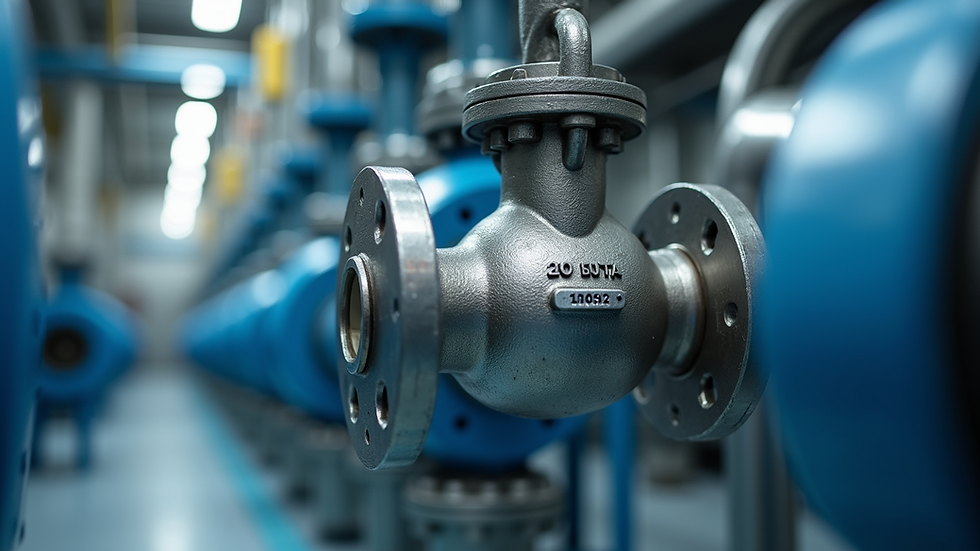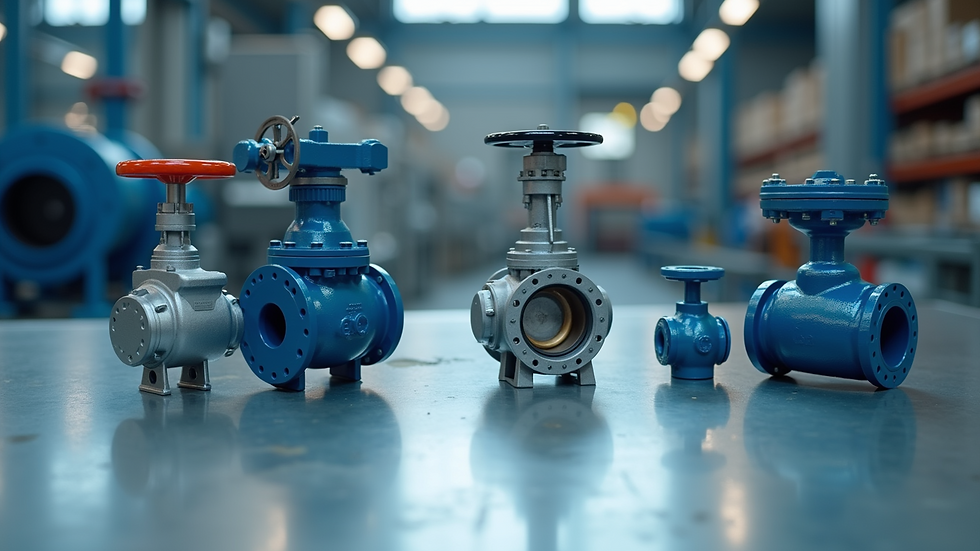Discover the Advantages of Customized Valve Solutions
- Mark Richardson
- Sep 22, 2025
- 4 min read
When it comes to selecting valves for industrial or residential applications, one size rarely fits all. Over the years, I have seen how tailored valve solutions can transform operations, improve efficiency, and reduce costs. Whether you are working in oil and gas, chemical processing, water treatment, or food and beverage sectors, understanding the benefits of customized valves is essential. In this post, I will share insights into why tailored valve solutions are worth considering, how material choices impact performance, and some practical tips to help you make informed decisions.
Why Tailored Valve Solutions Matter
Valves are critical components that control the flow of liquids, gases, and slurries in countless systems. Off-the-shelf valves might work for some applications, but they often fall short when specific conditions or requirements come into play. Tailored valve solutions allow you to:
Match exact operational needs: Pressure, temperature, flow rate, and chemical compatibility vary widely across industries. Custom valves can be designed to handle these unique conditions.
Enhance durability and lifespan: Selecting the right materials and design features reduces wear and tear, preventing premature failures.
Improve safety and compliance: Customized valves can meet stringent industry standards and regulations, ensuring safer operations.
Optimize performance and efficiency: Properly designed valves reduce energy consumption and maintenance downtime.
For example, in the chemical processing industry, valves must resist corrosive substances. A tailored valve with a specific lining or alloy can prevent costly leaks and contamination. Similarly, in water treatment plants, valves designed to handle abrasive particles extend service life and reduce replacement frequency.

Exploring Material Choices in Tailored Valve Solutions
One of the most critical decisions when customizing valves is the choice of materials. The material affects not only the valve’s durability but also its compatibility with the media it controls. Here are some common materials and their typical uses:
Stainless Steel
Best for: Corrosive environments, food and beverage, pharmaceutical industries.
Advantages: Excellent corrosion resistance, hygienic, easy to clean.
Limitations: Higher cost compared to carbon steel.
Carbon Steel
Best for: High-pressure applications, oil and gas, power generation.
Advantages: Strong, cost-effective, widely available.
Limitations: Susceptible to corrosion without protective coatings.
Bronze and Brass
Best for: Residential plumbing, water systems, low-pressure applications.
Advantages: Good corrosion resistance, easy to machine.
Limitations: Not suitable for highly corrosive or high-temperature environments.
Plastic and Composite Materials
Best for: Chemical processing, water treatment, lightweight applications.
Advantages: Corrosion-resistant, lightweight, cost-effective.
Limitations: Lower mechanical strength, limited temperature range.
Choosing the right material depends on factors such as the fluid type, temperature, pressure, and environmental conditions. For instance, a valve handling seawater requires materials resistant to salt corrosion, like duplex stainless steel or special coatings.

The Impact of Valve Design on System Efficiency
Beyond materials, the design of a valve plays a crucial role in system performance. Tailored valve solutions allow engineers to specify design features that optimize flow control and reduce energy losses. Some design considerations include:
Valve type: Ball, gate, globe, butterfly, and diaphragm valves each have unique flow characteristics and applications.
Sealing mechanisms: Customized seals can prevent leaks and withstand harsh chemicals or high temperatures.
Actuation options: Manual, electric, pneumatic, or hydraulic actuators can be selected based on operational needs.
Size and pressure rating: Proper sizing ensures efficient flow and prevents pressure drops.
For example, a butterfly valve with a custom liner can provide tight shutoff in a water treatment plant, while a globe valve with a special trim design might be preferred in steam systems for precise flow regulation.

Practical Tips for Selecting Tailored Valve Solutions
When considering tailored valve solutions, keep these practical tips in mind to ensure you get the best fit for your application:
Define your requirements clearly: Document operating conditions such as pressure, temperature, fluid type, and flow rate.
Consult with experts: Work with valve manufacturers or suppliers who understand your industry and can recommend suitable materials and designs.
Consider lifecycle costs: Look beyond initial purchase price to include maintenance, downtime, and replacement costs.
Verify compliance: Ensure valves meet relevant standards like ISO, ANSI, or industry-specific certifications.
Request prototypes or samples: Testing a valve in your system before full deployment can prevent costly mistakes.
By following these steps, you can avoid common pitfalls such as selecting valves that corrode quickly or fail under pressure, which can lead to operational disruptions.
Unlocking the Potential of Customized Valve Solutions
In my experience, investing in customized valve solutions pays off in the long run. Tailored valves not only improve system reliability but also provide peace of mind knowing that your equipment is designed specifically for your needs. Whether you are upgrading existing infrastructure or designing new systems, consider the advantages of customization:
Reduced downtime due to fewer failures and easier maintenance.
Improved process control with valves designed for precise operation.
Enhanced safety through compliance with industry standards.
Cost savings from longer service life and optimized performance.
If you are looking for a trusted partner to guide you through the selection and customization process, working with a reputable supplier who offers expert advice and a wide range of options is invaluable.
Looking Ahead: The Future of Valve Technology
The valve industry is evolving rapidly with advances in materials science, automation, and digital technologies. Smart valves equipped with sensors and IoT connectivity are becoming more common, enabling real-time monitoring and predictive maintenance. Additionally, new composite materials and coatings are pushing the boundaries of valve durability and performance.
As these innovations continue, tailored valve solutions will become even more critical. They will allow industries to meet stricter environmental regulations, improve energy efficiency, and adapt to increasingly complex processes.
By staying informed and partnering with knowledgeable suppliers, you can ensure your valve systems remain at the forefront of technology and reliability.
I hope this overview has shed light on the many benefits of tailored valve solutions. If you want to explore options or need expert guidance, don't hesitate to reach out to specialists who can help you find the perfect valve for your application. After all, the right valve is more than just a component - it’s a key to unlocking operational success.



Comments